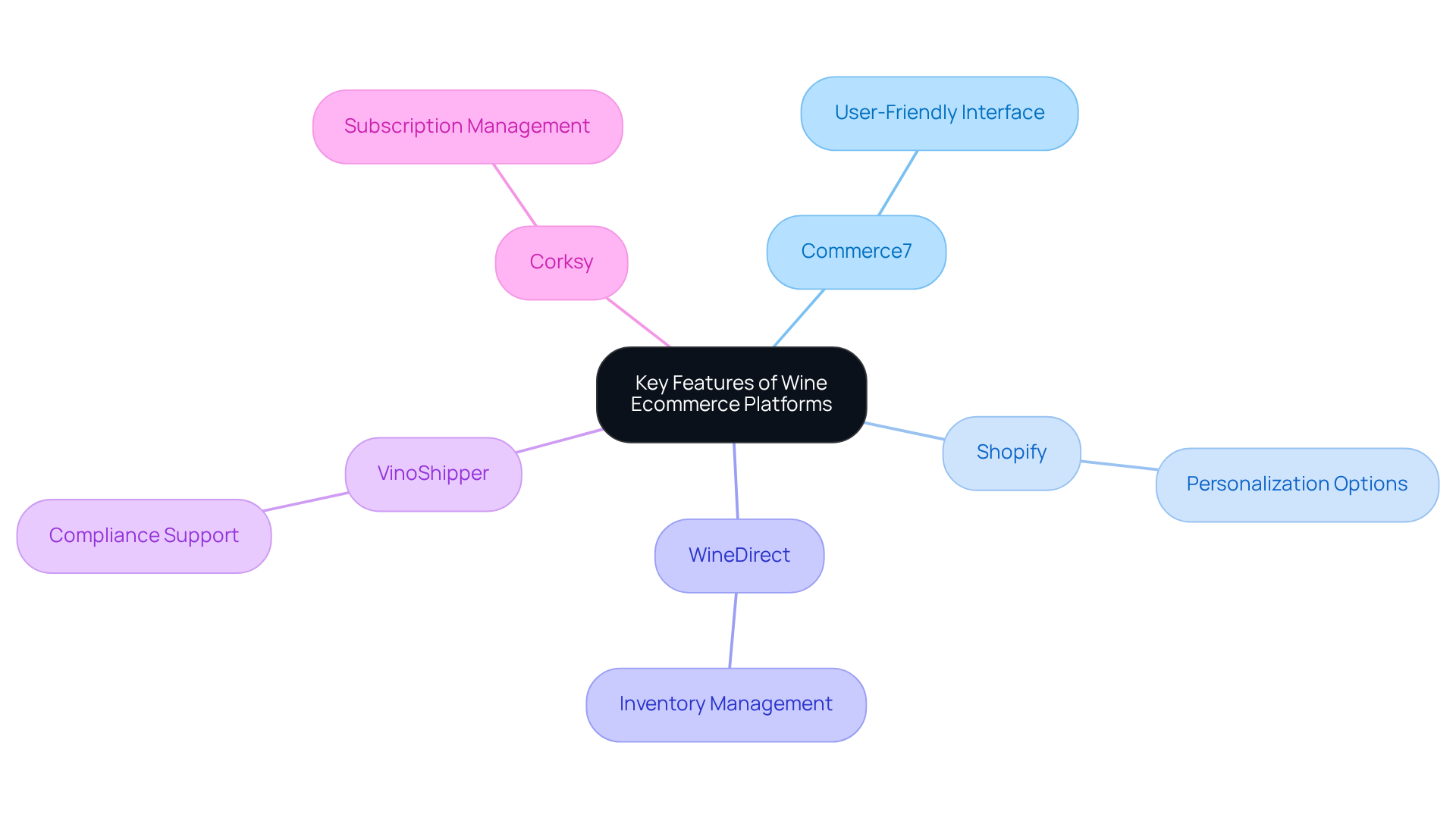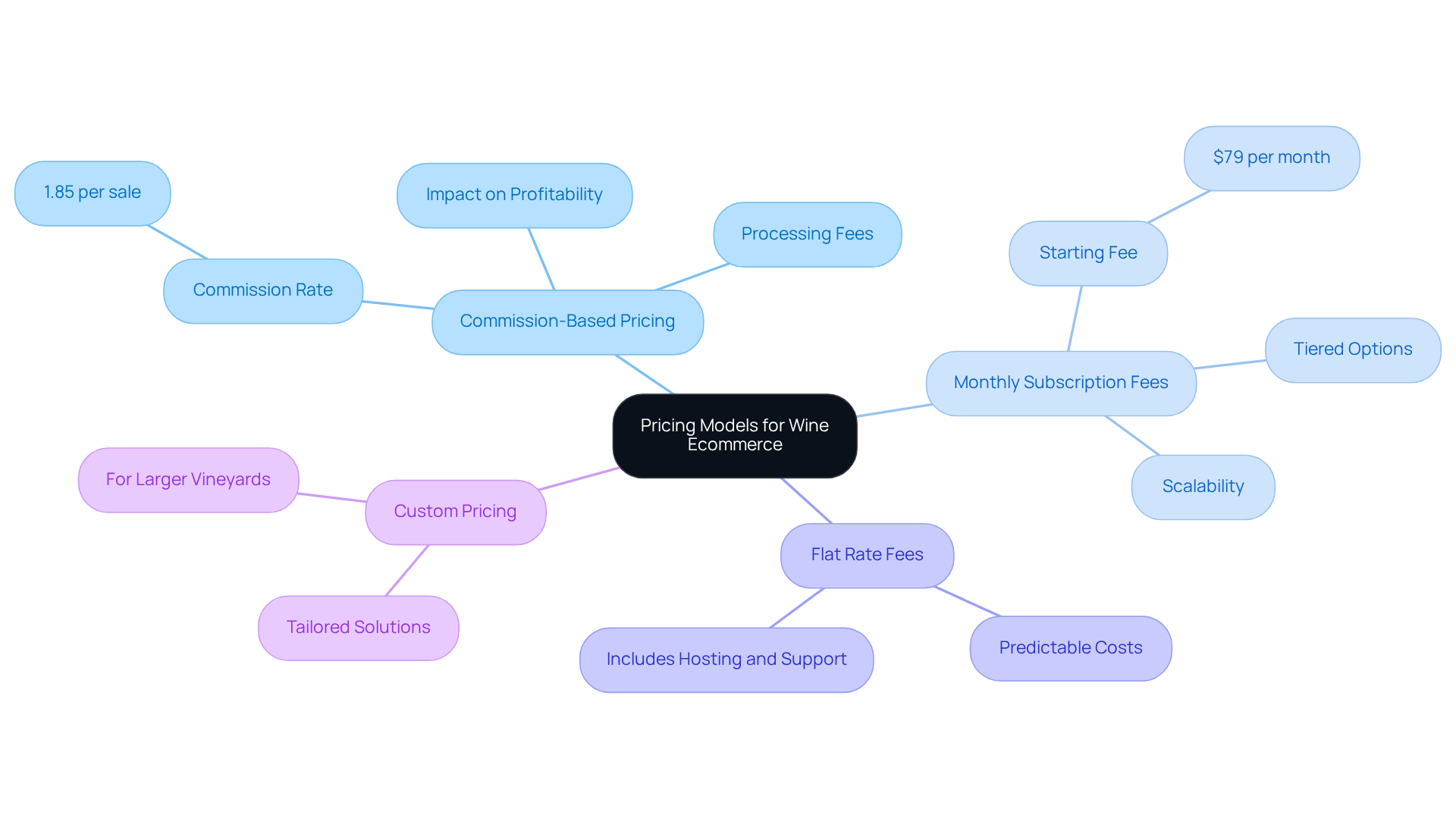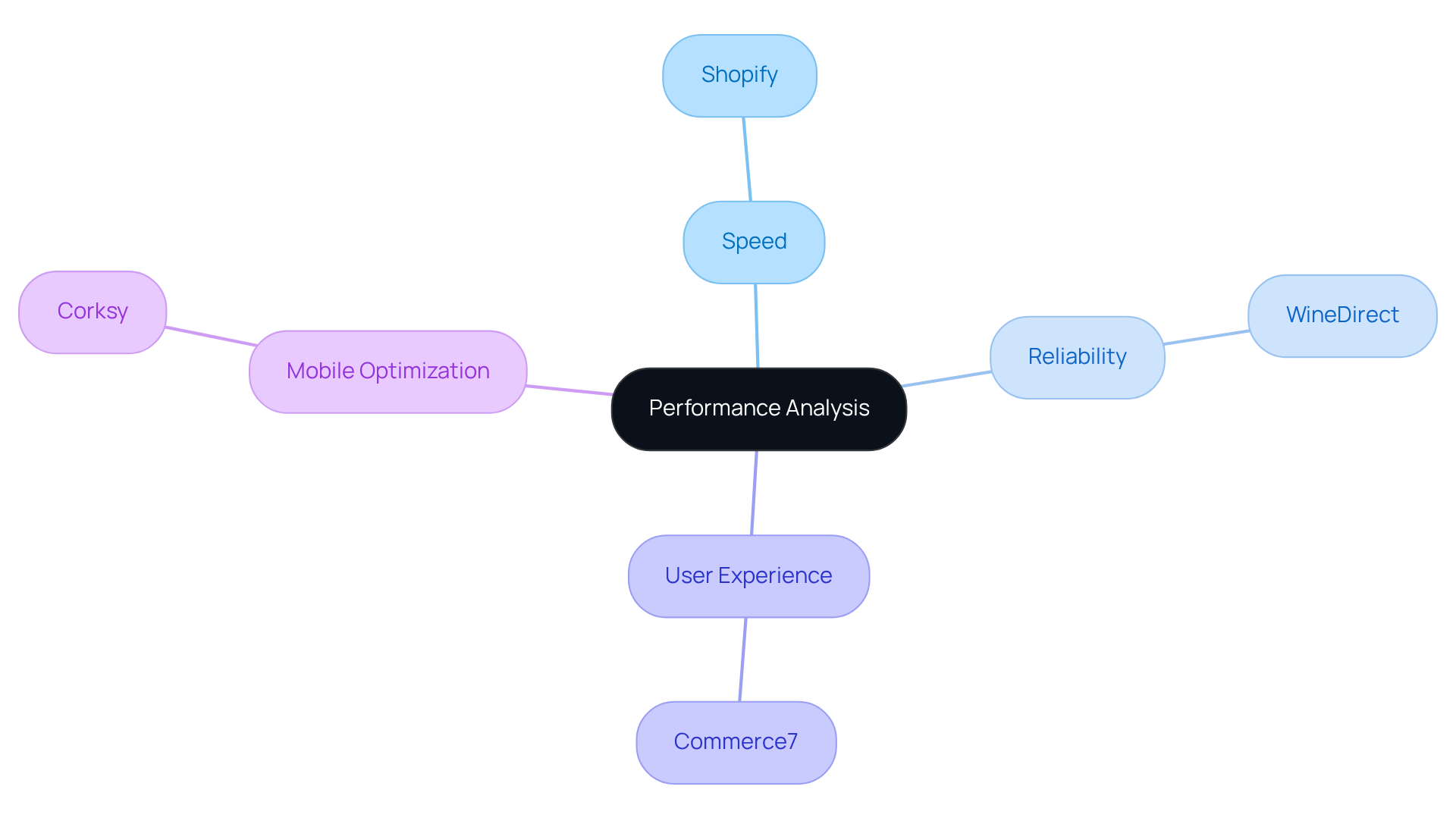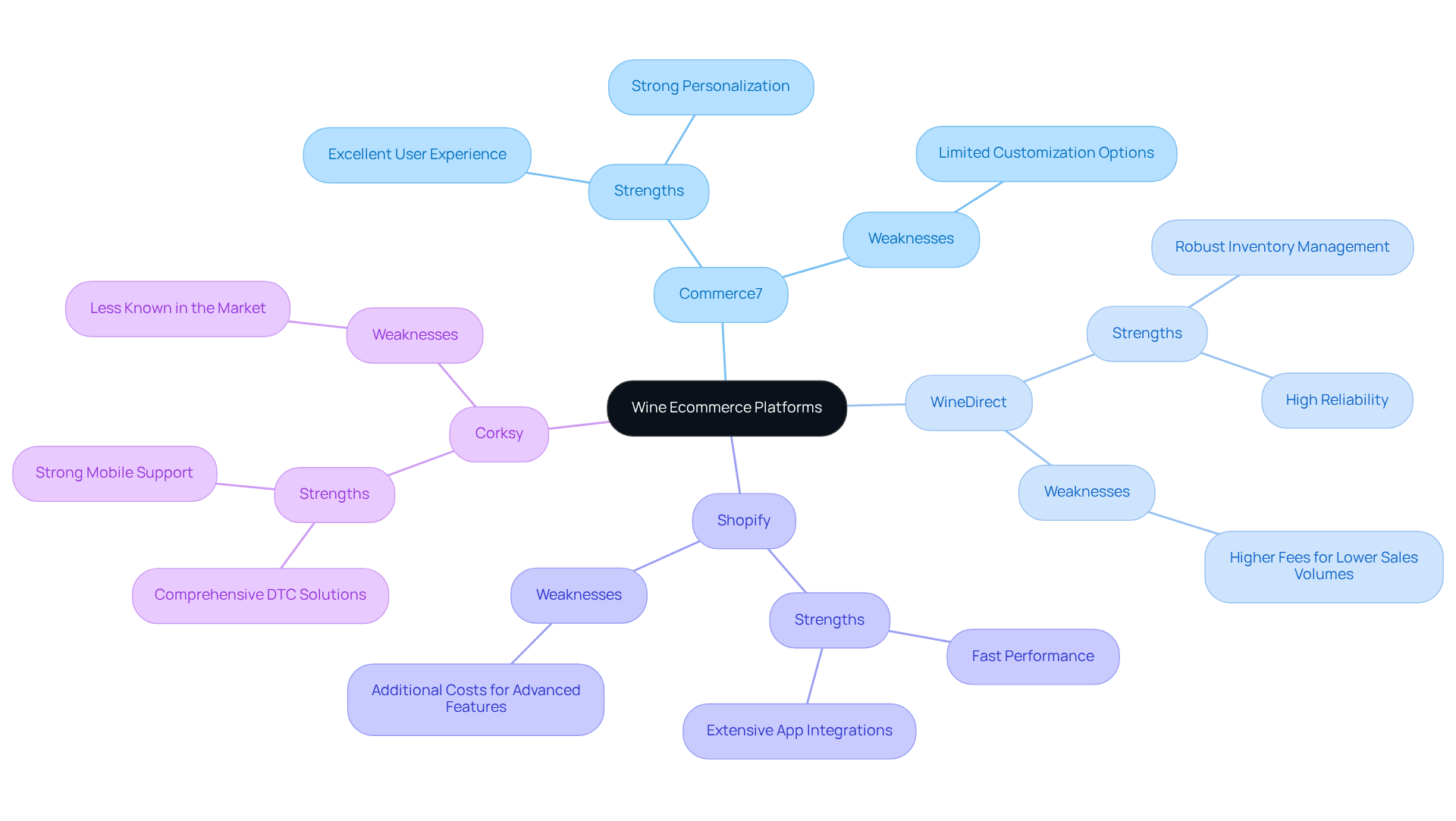Overview
This article examines the leading wine ecommerce platforms, meticulously evaluating their features, pricing, and performance metrics. It emphasizes platforms such as Commerce7, WineDirect, Shopify, and Corksy, elucidating how their distinctive attributes—including user experience, inventory management, and pricing models—significantly enhance their effectiveness in driving direct-to-consumer sales and fostering customer loyalty for wineries. By understanding these platforms, decision-makers can make informed choices that align with their business goals.
Introduction
In the dynamic landscape of online retail, wine producers encounter distinct challenges as they strive to forge direct connections with consumers. The complexity of navigating wine ecommerce platforms can be overwhelming. However, a thorough understanding of the features, pricing models, and performance metrics of leading options can reveal substantial revenue opportunities.
How can wineries select the ideal platform that not only fulfills their operational requirements but also elevates customer engagement and loyalty in an increasingly competitive market?
Key Features of Leading Wine Ecommerce Platforms
Prominent wine ecommerce platforms, including the like Commerce7, WineDirect, and Shopify, offer an array of features tailored to meet the unique needs of wine producers, particularly in generating reliable and enhancing customer loyalty. These key features include:
- : Commerce7 stands out with its intuitive navigation, facilitating a seamless browsing and purchasing experience for customers. This ease of use is crucial for converting casual buyers into dedicated club members.
- Personalization Options: Shopify excels in delivering customizable marketing tools that empower vineyards to tailor recommendations based on buyer behavior. This targeted approach significantly boosts through focused engagement.
- Inventory Management: WineDirect boasts robust inventory tracking systems, enabling wineries to manage stock levels effectively. This capability ensures that they can meet client demand without overextending their resources.
- Compliance Support: Numerous platforms, including VinoShipper, offer integrated compliance tools that navigate the complex regulations governing alcohol transactions. Such support is vital for maintaining operational integrity.
- : Corksy provides comprehensive features for managing wine clubs and subscriptions, enhancing and loyalty by fostering a sense of community and ongoing engagement.
Collectively, these attributes empower vineyards to implement on the best wine ecommerce platforms, driving consistent growth and amplifying their direct-to-consumer revenue initiatives.

Pricing Models and Cost Considerations
When evaluating the best , wineries must consider various that can significantly impact their operations.
- Commission-Based Pricing: Platforms like VinoShipper charge a commission per sale—approximately 1.85%—along with processing fees. This model can accumulate costs for high-volume sellers, making it crucial to assess its implications on profitability.
- : WineDirect offers tiered subscription options starting at $79 per month, with fees determined by transaction volume. This flexibility makes it an appealing choice for vineyards of various sizes, allowing them to scale their expenses with their growth.
- : Shopify presents a straightforward pricing structure, with monthly fees that encompass hosting and support. This predictability in costs is particularly attractive to those who prefer to avoid unexpected expenses.
- : Certain systems, such as Commerce7, provide tailored pricing for larger vineyards, enabling personalized solutions that cater to specific requirements.
Understanding these pricing models is essential for vineyards as they evaluate which of the best aligns best with their financial objectives and revenue forecasts. By carefully considering these options, that support their growth and sustainability.

Performance Analysis: Speed, Reliability, and User Experience
Performance stands as a pivotal differentiator among the .
- Speed is essential; Shopify exemplifies this with its renowned fast loading times, crucial for retaining customers who might otherwise abandon slow-loading sites.
- Reliability is equally important. WineDirect boasts a high uptime percentage, ensuring that vineyards can operate without interruptions, especially during peak selling periods.
- cannot be overlooked. Commerce7 prioritizes a seamless user experience through intuitive navigation and streamlined checkout processes, significantly reducing cart abandonment rates.
- is vital in today’s market. Platforms like Corksy cater to mobile users, guaranteeing a smooth shopping experience across devices, which is increasingly crucial as more consumers turn to smartphones for their purchases.
These performance elements are not merely enhancements; they are essential for businesses aiming to elevate their online visibility and through the best wine ecommerce platforms.

Comparative Overview: Strengths and Weaknesses of Each Platform
In the competitive landscape of wine ecommerce, understanding the strengths and weaknesses of the is crucial for wineries aiming to enhance their and . Here’s a comparative overview of the top wine ecommerce platforms:
-
Platform: Commerce7
- Strengths: Excellent user experience, strong personalization
- Weaknesses: Limited customization options
-
Platform: WineDirect
- Strengths: Robust inventory management, high reliability
- Weaknesses: Higher fees for lower sales volumes
-
Platform: Shopify
- Strengths: Fast performance, extensive app integrations
- Weaknesses: May require additional costs for advanced features
-
Platform: Corksy
- Strengths: Comprehensive DTC solutions, strong mobile support
- Weaknesses: Less known in the market compared to others
This overview serves as a valuable resource for wineries to assess which platform aligns best with their specific and [customer engagement](https://blog.enocap.com/10-ways-wine-pos-systems-enhance-winery-operations) strategies. By leveraging these insights, decision-makers can make informed choices that drive success in the dynamic wine market.

Conclusion
The exploration of the best wine ecommerce platforms unveils a landscape brimming with opportunities for wineries eager to elevate their direct-to-consumer sales. By harnessing features specifically designed for their unique needs—such as user-friendly interfaces, robust inventory management, and compliance support—wine producers can markedly enhance customer engagement and loyalty. Each platform offers a distinct blend of strengths and weaknesses, underscoring the critical nature of selecting the right solution that aligns with specific business objectives.
Key insights underscore the significance of performance elements like speed, reliability, and user experience in driving revenue growth. Platforms such as Shopify and WineDirect distinguish themselves with their rapid loading times and impressive uptime, while others, like Commerce7, shine in user experience. Additionally, pricing models play a pivotal role, with options ranging from commission-based to flat-rate fees, empowering wineries to choose a structure that best aligns with their financial goals.
In a fiercely competitive market, the right wine ecommerce platform can indeed be a game-changer. Wineries are urged to meticulously evaluate their operational needs and customer engagement strategies to make informed decisions. By doing so, they can leverage the potential of these platforms not only to amplify sales but also to forge enduring relationships with their customers, thereby ensuring sustainable growth in the ever-evolving realm of wine ecommerce.
Frequently Asked Questions
What are the key features of leading wine ecommerce platforms?
Key features include user-friendly interfaces, personalization options, inventory management, compliance support, and subscription management.
How does Commerce7 enhance the customer experience?
Commerce7 offers an intuitive navigation system that facilitates a seamless browsing and purchasing experience, helping to convert casual buyers into dedicated club members.
What personalization options does Shopify provide?
Shopify provides customizable marketing tools that allow vineyards to tailor recommendations based on buyer behavior, significantly boosting client retention through focused engagement.
How does WineDirect assist wineries with inventory management?
WineDirect features robust inventory tracking systems that enable wineries to effectively manage stock levels, ensuring they can meet client demand without overextending their resources.
What compliance support do wine ecommerce platforms offer?
Platforms like VinoShipper provide integrated compliance tools to help navigate the complex regulations governing alcohol transactions, which is essential for maintaining operational integrity.
How does Corksy contribute to customer loyalty?
Corksy offers comprehensive features for managing wine clubs and subscriptions, which enhance customer retention and loyalty by fostering a sense of community and ongoing engagement.
What is the overall benefit of these features for vineyards?
These features empower vineyards to implement transformative direct-to-consumer (DTC) strategies, driving consistent growth and amplifying their direct-to-consumer revenue initiatives.




